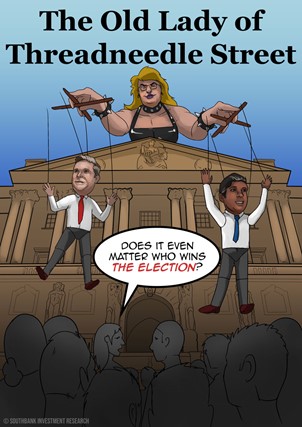- The UK has a banking “oligarchy”
- The Bank of England supposedly regulates it
- But does the “oligarchy” also control the government?
Before we begin, I want to highlight some important work my colleague Nick has been working on – information you’ll want to know as we go to the polls tomorrow.
He believes the new prime minister won’t be Starmer or Sunak… but someone much worse. Nick reveals more here. As well as what investors like you can do to protect yourself.
The Greeks had specific terms for different methods of government. One of these is “oligarchy” and it means, simply, rule by the few. But which few? The rich and otherwise powerful.
Here in the UK, a small number of banks are responsible for the bulk of all lending. Hence the UK has a banking oligarchy, or “oligopoly” as economists prefer to call it.
When a few players dominate an industry, they tend to find ways to collaborate rather than compete, as a larger number of smaller firms would do.
Competition is wonderful from the consumer’s point of view as it tends to result in some combination of higher quality products or services but at the lowest possible cost.
But from the producer’s perspective, the less competition the better. If they collaborate to fix prices and/or limit quality improvements, they’ll reap greater profits.
This doesn’t mean there is no competition at all under oligopolistic conditions, just less than there otherwise would be.
Although the Bank of England might deny it, there really isn’t any meaningful competition between the high street banks. They all offer, more or less, the same services and at similar rates.
Sure, there’s a little bit of jockeying for market share now and again. But when it occurs it serves to demonstrate just how little competition there really is.
We’ve just seen an example. Week before last, NatWest moved to lower rates by 0.17% even though the Bank of England held rates unchanged. Well, this past week, the other high street banks followed suit and, in several cases, leapfrogged NatWest with slightly larger reductions.
This is entirely typical behaviour for oligopolists. They hold the collaboration line for a good while but, eventually, one member breaks ranks in a grab for market share.
The others soon follow along, prices (or lending rates in this case) are re-set at whatever new level, and the collaboration begins anew.
There are other industries in which oligopolistic behaviour is observed. UK petrol prices tend to rise just as fast but fall more slowly than global oil market prices. The same dynamic can be seen in UK supermarket food prices.
But no oligopolistic industry has the sort of power wielded by the big banks: the power to fund the government. Or to not fund it.
The Bank of England is the UK’s bank regulator. While the Bank claims that it acts to promote competition in banking, the evidence is to the contrary.
If you’ve never watched the docudrama film Bank of Dave I strongly recommend you do so. It is quite eye-opening.
So, does the Bank regulate the banks? Or is it more the other way around?
Or does it not matter at all?
If their oligopolistic interests are all aligned, who’s making the rules doesn’t seem a cause for much concern. As well as at what interest rate the Bank decides to fund the government… or whether to fund the government at all.
Don’t believe me? Just ask Liz Truss who is really in charge of the country and she’ll tell you. Or just read her book. She spells it right out: the Bank of England.
Which brings me to a cheeky cartoon. A few weeks back, while chatting with the Southbank editors, I came up with an idea. The result is below:
Yes, that’s the “Old Lady of Threadneedle Street” – or Governor Andrew Bailey if you prefer – in dominatrix drag, with the current and probable future prime ministers hanging from marionette strings.
A picture may be worth 1,000 words but a cartoon can be worth even more.
Dark humour aside, it is important for investors to consider the implications of the unprecedented degree of the control the Bank now exercises over the country’s finances.
The most recent edition of The Fleet Street Letter discusses this topic at some length and my colleagues Nick Hubble and Kit Winder also recorded an interview to discuss it, which you can watch here.
Special post-election Q&A on Friday
Before I go, I’d like to let you know that on Friday myself and my colleague Nick Hubble and I will be holding a special post-election Q&A. Please send us your questions in advance to [email protected].
Until next time,

John Butler
Investment Director, Fortune & Freedom





